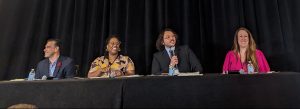With support from the Carl D. Perkins Career and Technical Education Act (Perkins V), Career Technical Education (CTE) policies and programs have increasingly focused on supporting the needs of underrepresented learners, pushing educators and policymakers to expand their focus beyond federal mandates to cultivate inclusive, dynamic, and diverse learning environments tailored to the needs of every student.
At Advance CTE’s 2024 Spring Meeting, we brought this conversation to the forefront with an expert panel including Dr. Brittani Williams, Director of Advocacy Policy and Research at Generation Hope, Joshua Rysanek, College, Career and Community Pathways Program Coordinator at the LANL Foundation, and Dr. Wil Del Pilar, Senior Vice President at The Education Trust. From navigating equity work in various state contexts, scaling high-quality opportunities for learners in special populations, and establishing effective cross-agency/organization partnerships to advance equity and access, we left with clear strategies to prioritize the needs of all learners.
Navigating Equity-Focused Work in Equity-Restricted States
The conversation opened up with advice for equity-minded leaders working in state contexts where equity-focused work is discouraged or, in some cases, prohibited. “While language differs from state to state, whether we are discussing it or not, it is the reality,” Joshua stated, and affirmed that we can build consensus on what equity gaps persist in disaggregated data; data can show that our systems are not equipping every student with skills, experiences, and opportunities that lead to family-sustaining wages.
Similarly, Dr. Del Pilar highlighted the persisting access and performance gaps across states and programs, noting that the approach to this work needs to be reconsidered, regardless of state political contexts, to better address learner needs. Dr. Williams affirmed that as our learner populations evolve, our system and supports should be redefined alongside them.
Scaling Opportunities for Special Populations
Despite single parents being an identified special population in Perkins V, few states are scaling strategies to support single parents in CTE. Dr. Williams expanded on how CTE can serve as a launchpad for parents’ learning through career development and advancement to ensure they have the employability skills required to achieve economic mobility. Further, she highlighted the importance of offering wraparound services, including flexible scheduling and virtual opportunities. “Inclusive and targeted support is important,” Dr. Williams stated.
Dr. Del Pilar emphasized the opportunity to leverage a two-generation approach that supports single-parent learners’ educational attainment alongside their young learners through local organizations or school settings.
Similarly, Joshua expanded on what he and his organization have learned when scaling high-quality CTE opportunities for learners in Tribal communities. “Approach Tribal communities with respect, humility, and a learning mindset,” Joshua said as he recalled many instances where Tribal communities become pigeonholed into specific heritages, assumptions, and harmful stereotypes. He remarked on how all Tribal and Indigenous communities are different. States need to meaningfully engage Native communities by learning about their cultures, assets, and challenges and address those needs rather than making assumptions about what they are in the first place.
Partnerships in Equity
We garnered some strategies to strengthen partnerships with community-based organizations to advance equity work in our states. Dr. Del Pilar suggested strengthening relationships with organizations that leaders already work with and co-constructing the partnership to ensure both parties can benefit and contribute. He stated that building new relationships upon already established ones may be as simple as asking, “Is there anyone else I can talk to who is doing this work?” at the end of community partner conversations.
Dr. Williams mentioned that inviting community organizations to the table and having a presence within the communities that leaders serve can create trust and buy-in to create long-lasting relationships. “Success in community engagement is being culturally responsive, culturally competent, and trauma-informed.”
 Preparations are underway for Advance CTE’s 2024 Fall Meeting in Phoenix, AZ, October 21-23! Visit the event page to save the date and learn more.
Preparations are underway for Advance CTE’s 2024 Fall Meeting in Phoenix, AZ, October 21-23! Visit the event page to save the date and learn more.
Marie Falcone, policy associate
Tags: Access and Equity, Career Development, Native and Tribal populations, Perkins V, special populations


